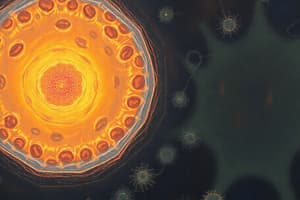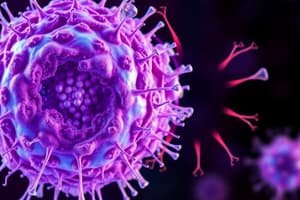Podcast
Questions and Answers
What is a characteristic unique to prokaryotic cells?
What is a characteristic unique to prokaryotic cells?
Which organelle is primarily responsible for ATP production?
Which organelle is primarily responsible for ATP production?
Which process occurs to produce gametes?
Which process occurs to produce gametes?
What function does the rough endoplasmic reticulum primarily serve?
What function does the rough endoplasmic reticulum primarily serve?
Signup and view all the answers
Which type of cell is specialized for signal transmission throughout the body?
Which type of cell is specialized for signal transmission throughout the body?
Signup and view all the answers
Which cellular process involves the communication between cells to coordinate functions?
Which cellular process involves the communication between cells to coordinate functions?
Signup and view all the answers
What is the primary function of lysosomes in a cell?
What is the primary function of lysosomes in a cell?
Signup and view all the answers
Which structure is involved in modifying, sorting, and packaging proteins and lipids?
Which structure is involved in modifying, sorting, and packaging proteins and lipids?
Signup and view all the answers
Study Notes
Definition of Cells
- Basic structural and functional unit of all living organisms.
- Can be unicellular (single-celled) or multicellular (composed of many cells).
Types of Cells
-
Prokaryotic Cells
- Lack a nucleus; DNA is in the nucleoid region.
- Generally smaller and simpler (e.g., bacteria, archaea).
- No membrane-bound organelles.
-
Eukaryotic Cells
- Have a nucleus containing DNA.
- Larger and more complex (e.g., plant and animal cells).
- Contain various membrane-bound organelles (e.g., mitochondria, endoplasmic reticulum).
Cell Structure
-
Plasma Membrane
- Composed of a phospholipid bilayer.
- Regulates entry and exit of substances.
-
Cytoplasm
- Gel-like substance inside the cell.
- Site for various cellular processes.
-
Nucleus
- Contains genetic material (DNA).
- Responsible for regulating cellular activities.
-
Organelles
- Mitochondria: Powerhouse of the cell, produces ATP.
- Ribosomes: Sites of protein synthesis.
-
Endoplasmic Reticulum (ER):
- Rough ER: Synthesizes proteins.
- Smooth ER: Synthesizes lipids, detoxifies.
- Golgi Apparatus: Modifies, sorts, and packages proteins and lipids.
- Lysosomes: Contain digestive enzymes to break down waste.
- Chloroplasts (plants): Site of photosynthesis.
Cell Division
- Mitosis: Produces two identical daughter cells for growth and repair.
- Meiosis: Produces gametes (sperm and eggs) for sexual reproduction.
Cellular Processes
- Metabolism: All chemical reactions within the cell, including catabolism and anabolism.
- Cell Signaling: Communication between cells to coordinate functions.
- Homeostasis: Maintenance of a stable internal environment.
Specialized Cells
- Muscle Cells: Contract for movement.
- Nerve Cells: Transmit signals throughout the body.
- Epithelial Cells: Form protective layers and barriers.
Importance of Cells
- Fundamental units for life processes.
- Diversity of cell types allows for specialization and complex life forms.
Cells: The Building Blocks of Life
-
Cells are the fundamental unit of life, existing as single-celled organisms (unicellular) or as building blocks for complex multicellular organisms.
-
Prokaryotic cells, like bacteria and archaea, are simple in structure and lack a nucleus. Their DNA is located in a region called the nucleoid and they do not contain membrane-bound organelles.
-
Eukaryotic cells, like plant and animal cells, are more complex with a nucleus containing their DNA. They also have various membrane-bound organelles that carry out specific functions.
Inside the Cell: A Look at Structure
-
The plasma membrane, composed of a phospholipid bilayer, controls the movement of substances in and out of the cell.
-
The cytoplasm, a gel-like substance, provides a medium for cellular processes to occur.
-
The nucleus, the cell's control center, contains the genetic material (DNA) and regulates cellular activities.
Organelles: Specialized Compartments
-
Mitochondria, known as the powerhouses of the cell, generate ATP, the cell's energy currency.
-
Ribosomes are the sites of protein synthesis, translating genetic code into functional proteins.
-
The endoplasmic reticulum (ER) comes in two forms:
- Rough ER: studded with ribosomes and involved in protein synthesis.
- Smooth ER: lacks ribosomes and synthesizes lipids, detoxifies harmful substances.
-
The Golgi apparatus modifies, sorts, and packages proteins and lipids for transport within or out of the cell.
-
Lysosomes are the cell's recycling centers, containing digestive enzymes to break down waste and cellular debris.
-
Chloroplasts, found in plant cells, are the sites of photosynthesis, converting light energy into chemical energy.
Cell Division: Growth, Repair, and Reproduction
-
Mitosis is a type of cell division that produces two identical daughter cells for growth and repair.
-
Meiosis is a specialized type of cell division that produces gametes (sperm and eggs) for sexual reproduction.
Life in Motion: Cellular Processes
-
Metabolism encompasses all of the chemical reactions that occur within a cell. This includes catabolism (breaking down of molecules) and anabolism (building up of molecules).
-
Cell signaling allows cells to communicate with each other, coordinating their functions and responses to the environment.
-
Homeostasis refers to the maintenance of a stable internal environment within the cell, crucial for its survival and optimal functioning.
Specialized Cells: Diversity for Function
-
Muscle cells are designed for contraction, enabling movement of the body.
-
Nerve cells, also known as neurons, transmit signals throughout the body, facilitating communication and coordination.
-
Epithelial cells form protective layers and barriers, forming linings for organs and cavities.
The Importance of Cells: Life's Foundation
-
Cells are the fundamental units of life, responsible for all biological processes and functions.
-
The diversity of specialized cells allows for the formation of complex multicellular organisms, each with unique characteristics and abilities.
Studying That Suits You
Use AI to generate personalized quizzes and flashcards to suit your learning preferences.
Description
This quiz covers the fundamental concepts of cells, including definitions, types, and structures. Test your knowledge about prokaryotic and eukaryotic cells, as well as various organelles and their functions. Perfect for students studying cellular biology.




